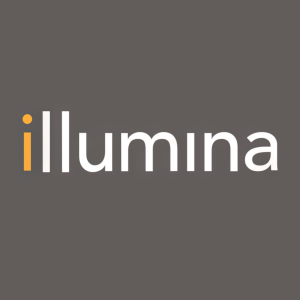Illumina drives genomic testing as standard of care in oncology through collaborative research presented at ASCO
Rhea-AI Summary
Illumina, a leader in DNA sequencing, announced significant research at the ASCO Annual Meeting (May 31–June 4, 2024). Key highlights include collaborations with Labcorp and Sarah Cannon Research Institute (SCRI) on comprehensive genomic profiling (CGP) and molecular residual disease (MRD) assays. Illumina presented 14 abstracts, showcasing CGP's superiority over single-gene testing (SGT) in non-small-cell lung cancer (NSCLC). MRD assay data highlighted its rapid turnaround, minimal sample needs, and high sensitivity. The research aims to enhance genomic testing accessibility in oncology, supporting precision medicine goals.
Positive
- Illumina presented 14 studies at ASCO, increasing its visibility and credibility in oncology.
- Research with Labcorp demonstrated a machine learning algorithm's efficacy in assessing MSI status from CGIP data in colorectal cancer.
- Collaborative research with SCRI showed CGP's superior performance over SGT in detecting biomarkers for NSCLC therapy, with CGP identifying all required biomarkers 71.7% of the time vs. 1.2% for SGT.
- Illumina's MRD assay exhibited fast turnaround, low input needs, and high sensitivity/specificity, promising advancements in cancer monitoring.
- Partnerships with major pharma companies and research institutes reinforce Illumina's commitment to advancing precision oncology.
Negative
- The press release did not provide specific financial data, leaving investors uncertain about direct economic impacts.
- No mention of regulatory approvals or commercialization timelines, which may affect market expectations and stock price.
- The success of the MRD assay and CGP relies on continued validation and market adoption, posing potential risks if outcomes are unfavorable.
News Market Reaction
On the day this news was published, ILMN declined 3.11%, reflecting a moderate negative market reaction.
Data tracked by StockTitan Argus on the day of publication.
Studies presented represent key focus areas, including building evidence for clinical utility of comprehensive genomic profiling; overcoming market access barriers, and progressing the whole-genome approach for MRD
"Illumina is proud of our collaborations across all areas of the oncology, research, clinical, and payer communities to produce strong evidence to further enable genomic testing for patients with cancer," said Nicole Berry, head of the
Illumina and Labcorp: innovation-driven research
Illumina and Labcorp share five abstracts accepted at ASCO. The organizations have a longstanding partnership working to build evidence of the clinical impact and value of comprehensive biomarker testing for patients across different cancer types, to ultimately increase community oncology physicians' access to the latest genomic testing. Among the joint abstracts accepted is a poster presentation on the development and application of a machine learning algorithm trained on multiomics biomarkers for the detection of tumor microsatellite instability (MSI), which is common in certain cancers (Abstract 1554). The study analyzed samples from 1838 patients with colorectal cancer using comprehensive genomic and immune profiling (CGIP). The study findings indicate that the machine-learning-driven approach accurately assessed MSI status of colorectal cancer and endometrial adenocarcinomas using CGIP data.
"Through our partnership with Illumina, we are deploying innovative research opportunities that leverage the strengths of our respective teams," said Shakti Ramkissoon, MD, PhD, vice president, medical lead for oncology at Labcorp. "This algorithm is especially exciting as a potential tool to improve assessment of MSI status."
Greater evidence supporting CGP over SGT
Illumina continues to work with leading research institutions to validate the clinical utility and value of CGP testing. CGP is a single next-generation sequencing assay that assesses hundreds of genes, including relevant cancer biomarkers, for therapy guidance. This year, a real-world analysis done with SCRI will present data demonstrating the performance of CGP versus SGT in guideline-recommended biomarker selection in non-small-cell lung cancer (NSCLC) (Abstract 8640).
"The findings showed that patients with stage IV NSCLC who underwent SGT received results for all nine guideline-recommended biomarkers only
This work builds on evidence presented by Illumina and its collaborators at ASCO 2023, including a study with Labcorp that demonstrated that the initial use of SGT increases subsequent CGP test cancellations, and concluded that SGT practice in the community oncology setting does not meet practice guideline recommendations and negatively impacts the potential benefit of subsequent CGP for NSCLC patients (2023 Abstract 6506).
Data shows progress on MRD assay
At ASCO 2024, Illumina will present an analytical performance evaluation of its MRD assay, highlighting its fast turnaround time, low input requirements, and high sensitivity and specificity over existing market options (Abstract 3060). Earlier this year, Illumina announced collaborations with pharmaceutical companies to innovate on its MRD research assay, which is currently under development on a whole-genome backbone.
"We're committed to delivering impactful research to help enable genomic testing in oncology care," said Pratheesh Sathyan, head of Oncology for the
About Illumina
Illumina is improving human health by unlocking the power of the genome. Our focus on innovation has established us as a global leader in DNA sequencing and array-based technologies, serving customers in the research, clinical, and applied markets. Our products are used for applications in the life sciences, oncology, reproductive health, agriculture, and other emerging segments. To learn more, visit illumina.com and connect with us on X, Facebook, LinkedIn, Instagram, TikTok, and YouTube
Contacts
Investors:
Salli Schwartz
858-291-6421
IR@illumina.com
Media:
Samantha Beal
PR@illumina.com
![]() View original content to download multimedia:https://www.prnewswire.com/news-releases/illumina-drives-genomic-testing-as-standard-of-care-in-oncology-through-collaborative-research-presented-at-asco-302157733.html
View original content to download multimedia:https://www.prnewswire.com/news-releases/illumina-drives-genomic-testing-as-standard-of-care-in-oncology-through-collaborative-research-presented-at-asco-302157733.html
SOURCE Illumina, Inc.








